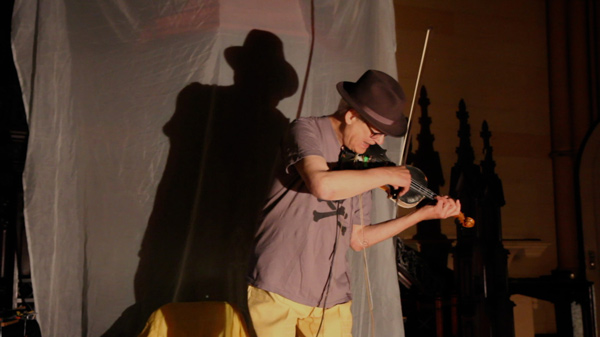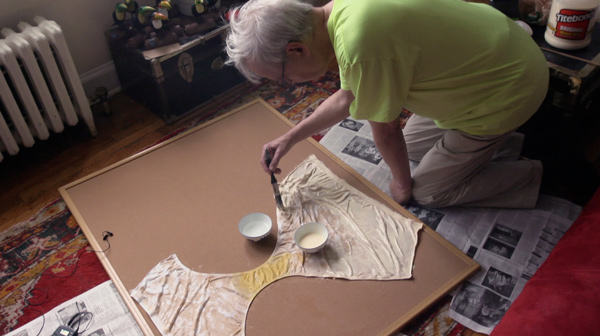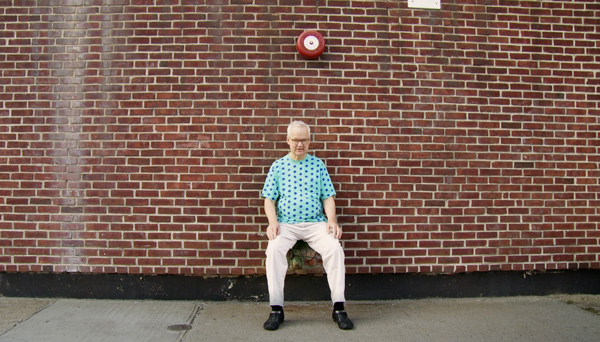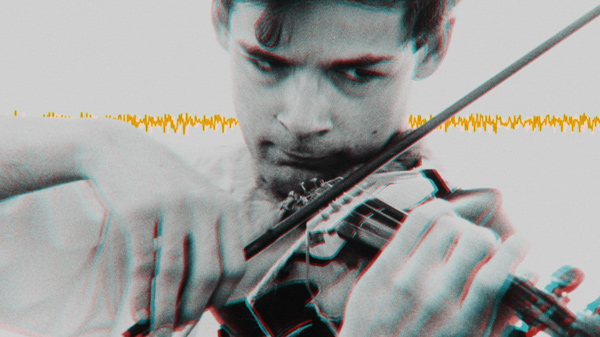Tony Conrad is one of the unlikeliest figures to be the subject of the kind of late-career historical recontextualization that authenticity-starved hipster youth have made their simulacral avant-garde. Don’t get me wrong. His bona fides are all in place; a pivotal figure in 1960s NYC experimental circles—the Velvet Underground was formed in his loft for God’s sake!—but his scattershot oeuvre and authority-destabilizing sense of humor should have conspired to thwart any attempts at canonization.
Thankfully, Tyler Hubby’s new documentary Tony Conrad: Completely in the Present—an unintentional requiem following Conrad’s death last April—simultaneously avoids turning its subject into a countercultural icon (mostly by allowing the man himself the lion’s share of screen time) while making a comprehensive—if not entirely coherent—corpus out of his sprawling, peripatetic career.

film still
To recap, Conrad was a violin-toting Harvard math student who fell under the sway of John Cage and Karlheinz Stockhausen, then hooked up with La Monte Young, John Cale and others to form the Theatre of Eternal Music (AKA The Dream Syndicate), a microtonal drone music collective whose two-years worth of daily recording sessions remain locked away in Young’s archives. Conrad also joined Cale in the proto-Velvets group The Primitives (alongside Lou Reed and Walter “Lightning Fields” De Maria!) to support the brilliant garage single “The Ostrich” with a tour of New Jersey shopping malls.
He acted in, and scored, Jack Smith’s Flaming Creatures (1963), a legendary landmark in Queer and Underground Cinema, then made his own hugely influential film called The Flicker (1966), which consisted entirely of alternating sequences of black-and-white film frames, resulting in irregular stroboscopic light patterns that generated visual hallucinations (or vomiting) in the viewer.
Oh yeah, and early on he teamed up with Henry Flynt to invent Concept Art and to picket monolithic cultural institutions like MoMA and the Lincoln Center, though this chapter gets almost no play in Hubby’s doc. He married and began collaborating with Beverly Grant, the actress that played The Cobra Woman in the follow-up to Flaming Creatures, and inadvertently invented acoustic ecology soundscape recordings by jump-starting Syntonic Research’s landmark “Environments” LP series. In the ’70s he produced a series of absurdist cinematic gestures, including pickled and deep-fried films, as well as his notorious Yellow Movies which consisted of cheap house paint applied to paper in the dimensions of a projected film, and left to unfold entropically over the ensuing decades.

film still
In 1972 he somehow hooked up with Krautrock pioneers Faust and recorded Outside the Dream Syndicate—an album that fell on deaf ears at the time but has since been recognized as a landmark in genre-blurring experimental drone-rock. After that, Conrad sort of disappeared into academic obscurity, teaching video at SUNY Buffalo from 1976 until his untimely demise. There, he wound up devoting much of his time to cable access programs helping children with their homework and providing a media platform for random members of the Buffalo community through man-on-the-street interviews.
This last period is the most intriguing chapter of Conrad’s career for me, and Hubby’s documentary clearly indicates that Conrad felt the same way. The doc dutifully unfolds Conrad’s gradual reemergence through his collaborations with Mike Kelley and Tony Oursler, the reissuing of the Outside the Dream Syndicate LP and subsequent flurry of archival and newly-recorded experimental epics—including the highly provocative release of a bootleg-quality recording from the Theatre of Eternal Music, over which Young threatened legal action. In his last decade, Conrad was taken up by the Art World, included in Whitney Biennials, feted, collected, anointed and restored.

film still
But Tony Conrad: Completely in the Present makes it clear that he was having none of it. He returns to Lincoln Center and is still disgusted. Onscreen he is charming and cherubic, genial and generous, but underlying it all there is a steely refusal to endorse or participate in art forms and systems that solidify into authoritarian power structures. From the POV of the glamorous art world, Conrad’s story is one of the happy restoration of the reputation of an Important Historical Figure found shuffling around in the Media Arts Department of Buffalo U—but the real story here, and what makes this an extraordinary and timely documentary, is that for Conrad there was an unbroken continuity between the elimination of the composer in the collaborative performances of the Dream Syndicate, and groping for the common denominator of 87 with Cherise on the Homework Helpline. Lincoln Center can’t touch that.
THIS THURSDAY Tony Conrad: Completely in the Present, directed and written by Tyler Hubby, March 16, at the Theatre at ACE Hotel DTLA; for more info click here
Additional screenings at these locations: March 21-26, Ann Arbor Film Festival; March 24, San Francisco Cinematheque at Yerba Buena Center for the Arts; March 31-April 6; one week run at Anthology Film Archives, NYC; other info:tonyconradmovie.com


